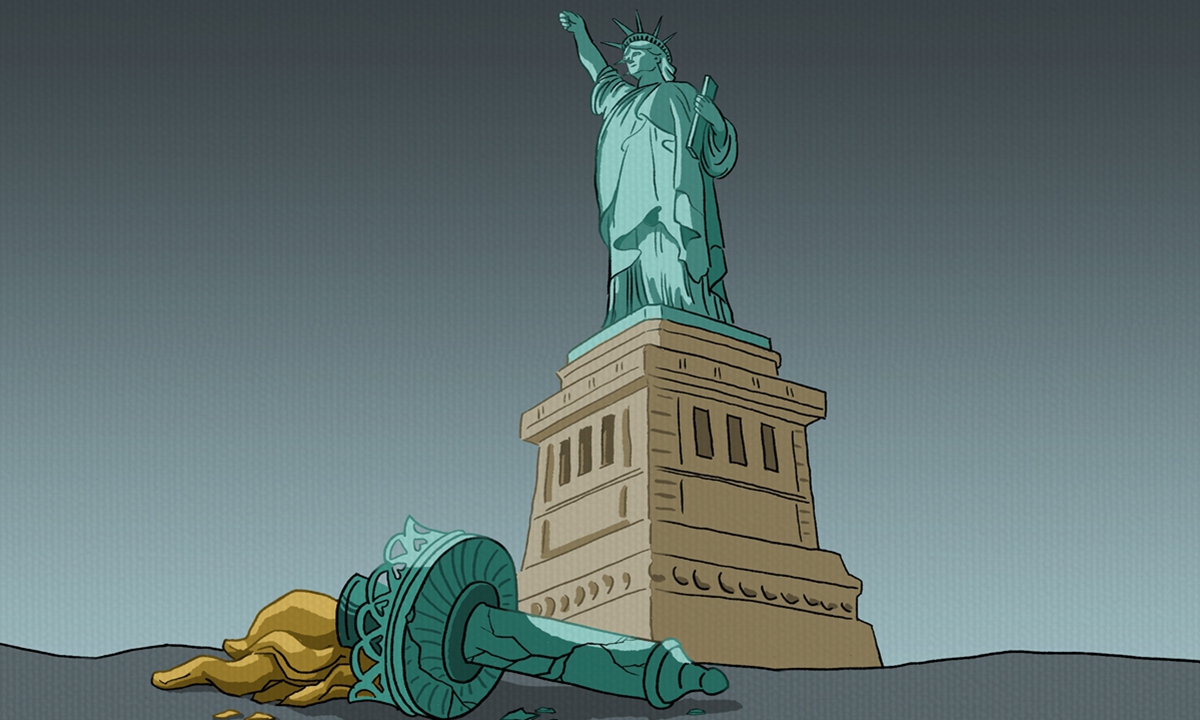
Degradation in the Western system Illustration: Liu Rui/GT
An article written by a Peking University law professor and published by the Chinese edition of the New York Times in February last year has flopped in the past two days. In the article, the professor asked, under a global pandemic, "why could some countries smoothly resolve it, while others cause major public incidents and even social and political crises?" He said "different countries and different systems have different abilities to resolve and respond to crises."It was a time when China was struggling to fight the COVID-19 pandemic and before the novel coronavirus had hit many parts of the world later. The professor wanted to strengthen his argument that China needs constitutional democracy.
The article flopped because one year later, China, which the Chinese professor claimed needs constitutional democracy, has successfully put the pandemic under control and swiftly resumed work and production, while the US, which labels itself the beacon for democracy, has seen more than 32.6 million confirmed cases and a death toll of more than 579,000. Recently, India, the most populous democracy in the world, became the global epicenter, with its daily confirmed cases reaching more than 400,000 at peak times.
People around the world have seen how incapable "democratic" countries are in dealing with such a public health crisis as the COVID-19 pandemic. Even some US media outlets are reflecting on the fragility of US-style democracy. An article in The Atlantic last year titled, "America's COVID-19 Disaster Is a Setback for Democracy." Another one in the Washington Post this year said that the pandemic is "symptomatic of a democracy in crisis and a political system that rewards cronyism over competence."
But still, many Westerners are reluctant to acknowledge China's achievement and its systematic advantages shown in the pandemic. In late March, US President Joe Biden underlined his challenges in dealing with China - "We've got to prove democracy works."
Song Luzheng, a research fellow at the China Institute of Fudan University, told the Global Times on Wednesday that the West's zeal to trigger a change in its system in China reflects its sense of insecurity, as the West only feels secure when China adopts the same system as them. He also noted that the aim of the West is not to make China stronger, but weaker.
"The West clearly knows the high risks for a multi-ethnic country like China to adopt the Western system. Even the old capitalist UK finds it hard to manage its multi-ethnic society," said Song.
After more than a year of the global struggle amid the pandemic, the challenges the West is facing come from not only its flawed system, but also the success of China's system. It feels that the justification of its system is seriously challenged.
The only thing it can do is to incite systematic change in China and deny China in order to secure its own interests. And since the hard power of the West is in decline, soft power, in other words values, becomes its weapon.
That the New York Times article flopped shows that the approach doesn't work anymore. The attractiveness of Western democratic systems to China and many other countries is declining, while China's attractiveness is increasing. The capability of a government is defined by whether it can protect the health of its people and raise their living standards.
Attacking China's political system could bring some psychological comfort to US elites, but offers no solution to the woes of the US.
